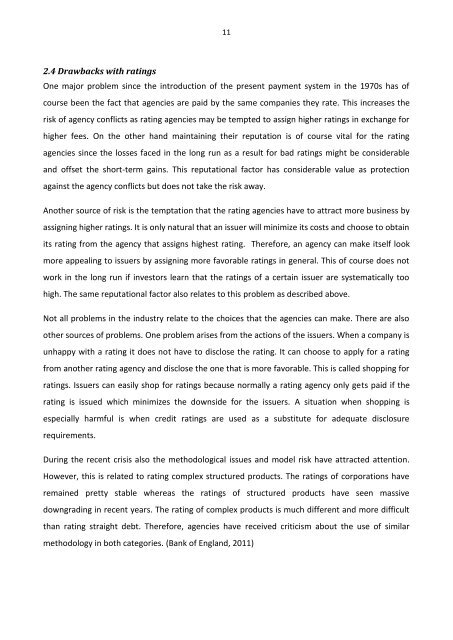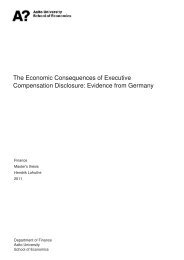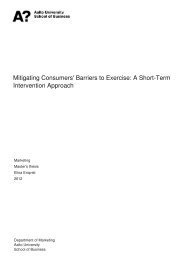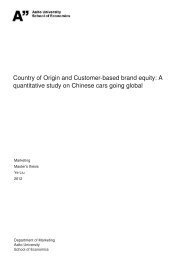Do Credit Rating Announcements Have Informational Value ...
Do Credit Rating Announcements Have Informational Value ...
Do Credit Rating Announcements Have Informational Value ...
Create successful ePaper yourself
Turn your PDF publications into a flip-book with our unique Google optimized e-Paper software.
11<br />
2.4 Drawbacks with ratings<br />
One major problem since the introduction of the present payment system in the 1970s has of<br />
course been the fact that agencies are paid by the same companies they rate. This increases the<br />
risk of agency conflicts as rating agencies may be tempted to assign higher ratings in exchange for<br />
higher fees. On the other hand maintaining their reputation is of course vital for the rating<br />
agencies since the losses faced in the long run as a result for bad ratings might be considerable<br />
and offset the short-term gains. This reputational factor has considerable value as protection<br />
against the agency conflicts but does not take the risk away.<br />
Another source of risk is the temptation that the rating agencies have to attract more business by<br />
assigning higher ratings. It is only natural that an issuer will minimize its costs and choose to obtain<br />
its rating from the agency that assigns highest rating. Therefore, an agency can make itself look<br />
more appealing to issuers by assigning more favorable ratings in general. This of course does not<br />
work in the long run if investors learn that the ratings of a certain issuer are systematically too<br />
high. The same reputational factor also relates to this problem as described above.<br />
Not all problems in the industry relate to the choices that the agencies can make. There are also<br />
other sources of problems. One problem arises from the actions of the issuers. When a company is<br />
unhappy with a rating it does not have to disclose the rating. It can choose to apply for a rating<br />
from another rating agency and disclose the one that is more favorable. This is called shopping for<br />
ratings. Issuers can easily shop for ratings because normally a rating agency only gets paid if the<br />
rating is issued which minimizes the downside for the issuers. A situation when shopping is<br />
especially harmful is when credit ratings are used as a substitute for adequate disclosure<br />
requirements.<br />
During the recent crisis also the methodological issues and model risk have attracted attention.<br />
However, this is related to rating complex structured products. The ratings of corporations have<br />
remained pretty stable whereas the ratings of structured products have seen massive<br />
downgrading in recent years. The rating of complex products is much different and more difficult<br />
than rating straight debt. Therefore, agencies have received criticism about the use of similar<br />
methodology in both categories. (Bank of England, 2011)















